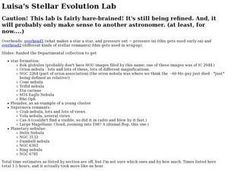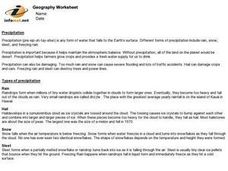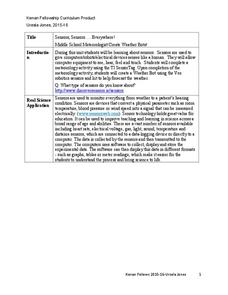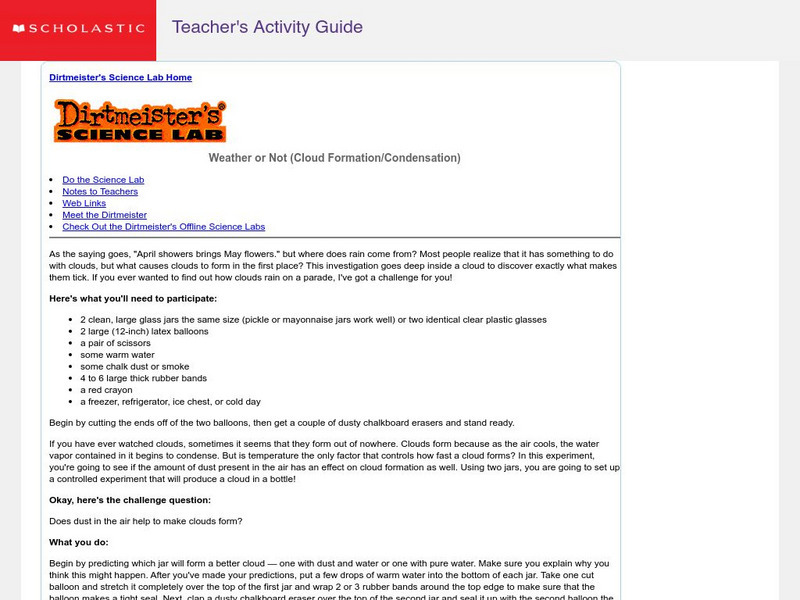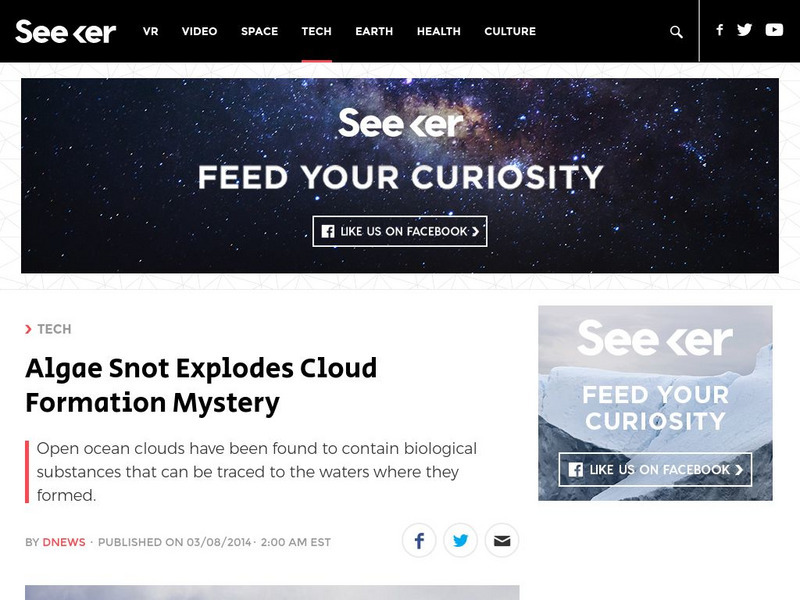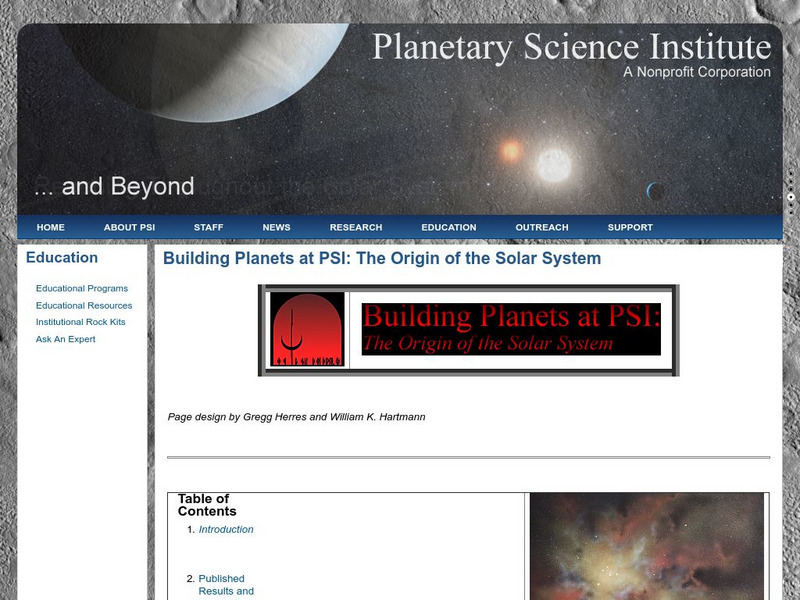Curated OER
Tracking Ozone
Students track an ozone event in Groton, CT. They compare weather changes and the subsequent ozone levels. Also, they make comparisons and determinations about ozone levels.
Curated OER
Acid Rain
Students write paragraphs and color illustrations about acid rain. They color in where gases come from, where they mix, and where they return. They discuss where acids form in the atmosphere and list manmade sources of gases.
Curated OER
Luisa's Steller Evolution Lab
Students examine stars and constellations in the night sky. They complete a KWL chart and calculate the mass of stars. They also discuss how a star is formed.
Curated OER
Precipitation
Fourth graders identify the conditions that create rain. They read and discuss weather records, and write a news article that includes factual information fom one of the listed weather records.
Curated OER
Let's Forecast the Weather!
Students study meteorology and weather forecasting. They set up a weather forecaster area in their classroom using a large classroom map, a pointer stick, a microphone connected to an amplifier, a play suit jacket or lab coat, and a...
Kenan Fellows
Sensors, Sensors…..Everywhere! Middle School Meteorologist Create Weather Bots!
My forecast is that you'll want to use the resource. Pupils design and create a weather bot as part of a project-based unit. These bots should be able to measure temperature, humidity, barometric pressure, wind speed and direction, and...
Curated OER
Weather Watchers
Learners identify basic weather instruments and how they are used to record weather data. Students define several vocabulary terms as stated in instructional activity. Learners use basic instruments to record weather data in their area....
Curated OER
Projects
Pupils write a typed report. In this writing lesson students type a 3 to 5 page report and present it to the class.
Curated OER
A Message in a Bottle
Students investigate the motion of water currents by mapping the possible movement of messages cast into the ocean in bottles.They accurately plot the appearance of bottles on a world map and illustrate the flow of an ocean current...
Australian Broadcasting Corporation
Australian Broadcasting Corporation: News in Science: Soaring the Glory
Absolutely fascinating site on an interesting cloud phenomenon called the Morning Glory! Discover something new as you learn all about this massive backwards-rolling cloud formation.
Center of Science and Industry
Cosi Columbus: Clues About Clouds
Science experiment that simulates how clouds are formed. Includes full list of materials, procedures, and scientific explanation of what must happen in the atmosphere for cloud formation to occur.
Scholastic
Scholastic: Dirtmeister's Science Lab: Weather or Not
Simple experiments for exploring clouds and cloud formation. You'll find out whether dust in the air helps cloud formation and discuss how dust helps meteorologists make weather predictions.
Science Education Resource Center at Carleton College
Serc: Investigating Three Main Ingredients Needed to Create a Cloud in a Bottle
In the science lab, students will create and observe the conditions necessary to make a cloud in a bottle.
Seeker
Seeker: Week of 3 10 14: Fingerprinting Clouds
Scientist have recently discovered that clouds possess far more unique traits than just their shapes. Read about the scientific discovery that at least some clouds contain biological particles that can be analyzed to show where the cloud...
Other
North Carolina Museum of Natural Sciences: Groundhog Day 2010 [Pdf]
Designed for Grades K-8, this teaching guide is chock-full of ideas for celebrating Groundhog Day, with activities like making shadow puppets, examining weather lore and studying cloud formations.
Sophia Learning
Sophia: Bill Nye Demonstration: Cloud in a Bottle
Watch and learn with Bill Nye the Science Guy as he demonstrates how clouds form in the atmosphere using a glass bottle and a bicycle pump. [2:10]
Science Buddies
Science Buddies: Cumulus Maximus: Make Your Own Cloud!
In this experiment, you'll make your own cloud in a jar, and get to test the conditions that are required to make a cloud form.
Alabama Learning Exchange
Alex: How Clouds Form
Cloud formation results when warm, humid air rises and cools, causing the water vapor in the air to condense and form clouds. In this lesson, learners will conduct an activity that demonstrates how this occurs.This lesson plan was...
Science Struck
Science Struck: Nimbus Clouds: Facts
Explains how clouds are classified and the characteristics of nimbus clouds.
Teachers.net
Teachers.net Lesson: Weather
Here are several great lesson ideas for a weather unit. The lessons cover topics in math and science including making clouds, recreating the water cycle, and making a tornado. There is also a list of weather resources for more information.
Extreme Science
Extreme Science
Explore the science behind the "extremes" in our world. Organized into sections on earth science, the animal kingdom, technology, and space science, this site opens your eyes to giant creatures, amazing technological advances, vast...
Math Science Nucleus
Math/science Nucleus: Cloud Poem Animation
This animation, in a storybook format, tells the various types of clouds (stratus, cirrus, nimbus) through a picture poem.
Library of Congress
Loc: Earth as Art: A Landsat Perspective
A really cool site showing Satellite (Landsat 7) images of unique geographical and meteorological phenomena. Images show cloud formations to rainforest devastation.
Other
Planetary Science Institute: Building Planets at Psi
An article about the Planetary Science Institutes's advanced computer software, which it uses to model the way the solar system may have formed. Includes some insights into the results already obtained.




